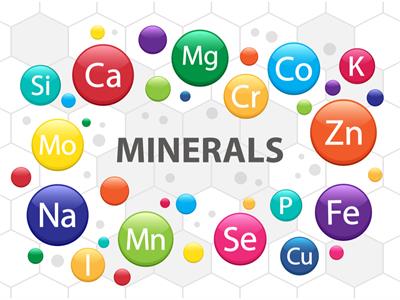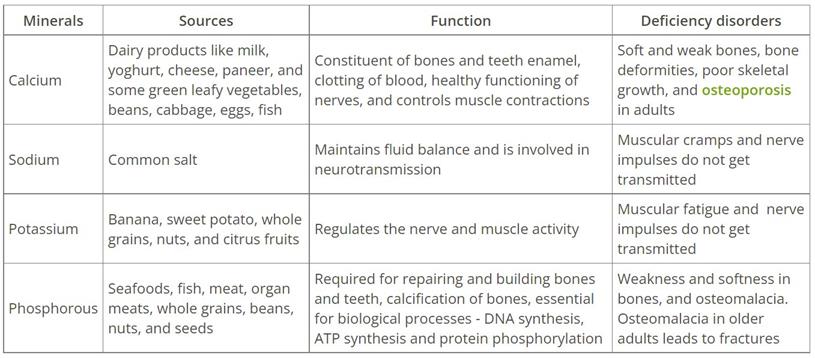PDF chapter test TRY NOW
Minerals are essential inorganic substances required for an organism to perform biological functions of life. They are required for the regulation of normal body function.
Functions of minerals:
They are the constituents of the bones, teeth, blood, tissues, muscles, and nerve cells.

Minerals
Minerals are responsible for:
- Structural functions that involve skeleton and soft tissues - building strong bones
- Regulatory functions that includes neuromuscular transmission
- Blood clotting
- Oxygen transport
- Enzymatic activity - involved as cofactors in enzymatic reactions.
- Used to synthesize hormones, enzymes
Green leafy vegetables like spinach, pulses, eggs, milk, fish and fruits are important sources of minerals in our diet.
Minerals are also a protective food. Some important minerals needed for growth and healthy life are calcium, phosphorus, magnesium, sodium, potassium and chloride, iron, zinc, iodine, selenium and copper. There are \(16\) different minerals present that is needed for our body.
Types of minerals:
1. Macrominerals
2. Microminerals
1. Macro minerals:
The macrominerals are required in relatively larger amounts.
Example:
Sodium, Calcium, Phosphorous, Potassium, and Magnesium are macrominerals.
2. Microminerals:
Microminerals are required in relatively lesser quantities. They are also known as trace elements.
Example:
Sulfur, Chlorine, Iron, Copper, Cobalt, Zinc, Manganese, Iodine, Molybdenum, and Selenium are microminerals.
Minerals are available in various food items such as seafood (phosphorous), bananas (potassium), green leafy vegetables (magnesium), salt (iodine, sodium) and dark chocolates (copper).
Functions of some macro minerals:

Functions of some microminerals:

- Cretinism is observed in infants or children with severe iodine deficiency. Iodine deficiency in the diet during the pregnancy of mother causes cretinism.
- Anemia is caused due to iron deficiency where there is not enough healthy red blood cells. Anaemia can cause light-headedness, dizziness, and tiredness.
